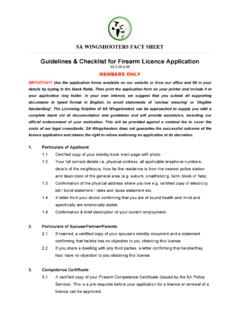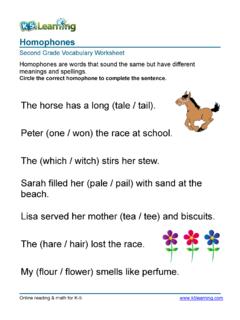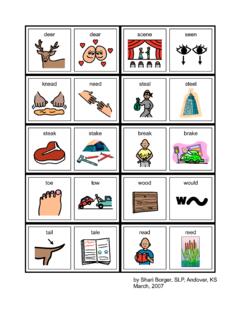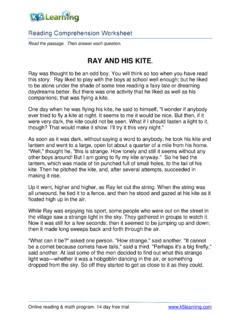Transcription of To dock, or not to dock? …..not a short tale. By Mike Ferrar.
1 To dock, or not to dock? ..not a short tale. by mike ferrar . The issue of docking a dog s tail has become a seriously vexed question. There are factions, both for and against, and there s a fair amount of dogma. Misinformation abounds, and getting to the bottom of it all isn t easy. One is also left with the impression, on delving deeply, that some of the misinformation isn t out there by accident. Some in the factions seem very determined to ensure that their dogma with a long tail prevails. So, what s so vexing about it? Around the issue, there are a number of intimidating words and phrases bandied about. It s illegal ; the Ban , and at your own risk are some of these.
2 A glance through some of the dramatis personae involved is helpful. You have the South African Veterinary Council (SAVC), the South African Veterinary Association (SAVA), the National Council of the Societies for the Prevention of Cruelty to Animals (NSPCA), SA Wingshooters Association, The Working Spaniel Association, The Weimaraner Club, the Kennel Union of South Africa (KUSA) and it s Field Trial Liaison Council (FTLC), The Docked Breeds Association of South Africa, and, significantly, the State, which is brought in to the matter through its own Legislative Statute. The nub of the matter turns on two issues: firstly whether the practice of docking of tails constitutes cruelty, and secondly whether the practice of docking of tails constitutes a contravention of the Law, is illegal.
3 These two issues are inextricably linked, since the answer to one question determines the answer to the other. I walked headlong into the issue on having a litter of English Springer Spaniels born to my beautiful Springer, Georgie, who herself has a docked tail, as does the Sire of the Litter. The question of the docking of their tails suddenly assumed enormous urgency, since if it was to be done, it would have to be done within three or four days of birth. I sms d our nearest vet not close by here in my platteland environment, nor easy to consult as he ranges the Karoo, out of cell range, doing what city dwellers would describe as House Calls.
4 An SMS is by definition a short Message Service; no scope for detail, and his reply was pretty succinct. It s illegal. Can t do it. Why illegal, I wondered? And what makes it so? I had heard that there was something about docking of tails, but was very sketchy on detail. So I set about investigating, with my lawyerly instincts on full alert. I first looked for legislation something that expressly stated It is an offence to dock any tail on any dog and stated further that Any person found guilty of having docked a dog s tail, shall be guilty of an offence, and shall be liable to be sentenced to a fine of not less than , or.
5 Month s imprisonment, or both . And if it is now illegal, why? It usen t to be, so what has precipitated the change? My delving has produced much of interest, not a little controversy, some clarity, and quite some muddy water. The Vets are adamant. They won t do it. Their principal reason for their refusing to do it lies in the decision by the SAVC that as of 1 June 2008, it will no longer condone routine tail docking of puppies by veterinarians. The SAVC is the statutory body that regulates the veterinary and para-veterinary professions and is authorised and empowered by the Veterinary and Para-Veterinary Professions Act No.
6 19 of 1982 to set and maintain professional standards for Veterinarians and Para-Veterinarians. The SAVC explains the import of their decision as follows: 1 Veterinarians who perform tail docking, unless for justifiable medical reasons, will be liable for prosecution under the Animal (sic) Protection Act No. 71of 1962. Veterinarians found guilty under this Act will automatically be investigated for unprofessional conduct by the SAVC under the Veterinary and Para-Veterinary Professions Act, 1982. The SAVC goes on to explain: The National Council of SPCAs (NSPCA), as the body primarily responsible with applying the tenets of the Animal (sic) Protection Act has in the past not enforced the relevant clause in the Act due to the fact that the SAVC has in the past condoned the performing of the procedure.
7 This has created a legal loophole that would have made the successful prosecution of any person based on the Animal (sic) Protection Act unlikely to succeed. This has now changed with the SAVC decision. Although the SAVC decision only directly affects veterinarians, lay people who perform the procedure will now also be liable under the Animal (sic) Protection Act. It is implicit in their reasoning that the fact that they no longer condone routine tail docking of puppies provides support for the view that tail docking constitutes either a maiming of a dog, or causes unnecessary suffering. Their policy statement, whilst clear in stating that any veterinarian found guilty of an offence under the Animals Protection Act will be automatically investigated for unprofessional conduct, is not clear on whether a tail docking per se, for which the veterinarian has not been prosecuted under the Animals Protection Act, is itself regarded as unprofessional conduct, for which the veterinarian can be censured in terms of the Veterinary and Para-Veterinary Professions Act.
8 In this regard, legal opinion exists that is of the view that the SAVC has failed to properly and lawfully amend its Code of Conduct pertaining to the docking of dogs tails, in that the procedures for notification of the Resolution bringing about the change 1 Extracts from The South African Veterinary Council policy on tail docking in dogs , accessed in 2010 from website have not yet been properly complied with, nor has Ministerial Approval, as required by the Veterinary and Para-Veterinary Professions Act, been given. 2 The Legislative Statute relevant to the issue is the Animals Protection Act No.
9 71 of 1962, passed by the State with the specific purpose of consolidating and amending the laws relating to the prevention of cruelty to animals, repealing the old Prevention of Cruelty to Animals legislation, and which came into force on 1 December 1962. There have been various amendments to certain of the provisions of this act since December 1962. The sections relevant to this discussion are: Section 2(1)(a) of the Act, which provides that any person who: ..ill-treats, ..tortures or maims ..or any animal; shall be guilty of an offence under the Act; Section 2(1)(r) of the Act, which provides that any person who: by wantonly or unreasonably or negligently doing, or omitting to do any act or causing or procuring the commission or omission of any act, causes any unnecessary suffering to any animal; shall be guilty of an offence under the Act; Persons found guilty of these offences under the Act shall be liable to a fine not exceeding R4000 or in default of payment to imprisonment for a period not exceeding 12 months or to such imprisonment without the option of a fine.
10 Section 8 of the Act, which confers certain powers upon officers of the society for the prevention of cruelty to animals with the written authority of a Magistrate, to make arrests without a warrant, and to conduct searches of the premises of any person reasonably suspected of having committed an offence under the Act. Section 9 of the Act, which provides that if at the trial of any person on a charge of an offence under the Act, the court is satisfied that any person or body has without reasonable cause and vexatiously lodged the complaint which has led to such a trial, the court may award costs against such person or body.









